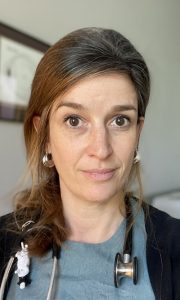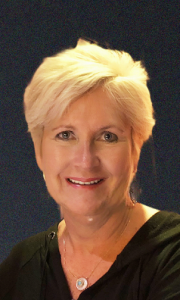Drs. Anamaria Richardson (left) and Suzanne Lewis (right) are recipients of the UBC Faculty of Medicine 2021/2022 Precision Health Catalyst Grant award for their project titled “Use of Long Read Whole Genome Sequencing to Drive Community-Based Patient-Oriented Care for Autism Spectrum Disorder.”
Click here to read a summary of the project.


Tell us about the research work you’re doing related to precision health?
AR: I have been working within the autism community for a number of years, and many parents of patients are curious about the ‘why’ of autism. As every individual with autism is so different from each other, the only reason to answer this question fully is through precision health. An option to be able to present community patients and parents with a chance to understand the etiology of their child’s autism more clearly and specifically is an incredible opportunity.
SL: With the nature of Autism Spectrum Disorder (ASD), there is no “one size fits all”. Our group’s research translates to the provision, for clinicians, of earlier diagnostic tools, health management and treatment guides that can change current clinical practice and improve outcomes.
How does technology play a role in your research?
SL: Our research leverages the most sophisticated and accurate technology for long-read whole genome sequencing and epi-genome analyses using the Oxford Nanopore PromethION platform in collaboration with Dr. Steven Jones Lab at the BC Genome Sciences Center. Together with Big Data bioinformatics technologies supported through our partnership with the Canadian Digital Technology Supercluster Autism Sharing Initiative and Innovation UBC, our group’s three major activities focus on: 1) identifying key multi-omic signatures, clusters and markers for autism with or without intellectual disability (ID); 2) data integration and interrogation for defining mechanistic pathways and expected clinical outcomes 3) advancing KTE and advocating for informed changes to clinical practice and policy for optimally supporting individuals and families living with autism spectrum and related neurodevelopmental conditions.
AR: The Oxford Nanopore Platform can provide the most detailed and in depth look at an individual’s genome to further understand and inform next steps in investigations, surveillance or screenings for an individual.
What role does precision health play in childhood research?
AR: Precision health is the way of the future – it allows for children to be treated as individuals and to understand what a specific genotype means to a child. Our understanding currently relies on generalizations based on phenotype and a precision medicine approach would ensure a patient-centred approach to care.
SL: Autism Spectrum Disorder (ASD) is the most common childhood developmental disability, with 1 in 50 school aged children currently diagnosed in Canada, indirectly impacting more than 1 in 20 people including parents, siblings and grandparents. An ASD diagnosis is not informative of an individual patient’s health needs and functional capabilities, currently or during their lifetime (e.g. are they high functioning with savant qualities, or are they low functioning, non-verbal, with an intellectual disability or epilepsy). Our precision health approach to autism is progressing in developing transformative new genomic and related multi-omic strategies to identify children with (or at risk for) ASDs much earlier, and a framework with which to classify patients with ASD based on genotype, deep clinical and molecular phenotype profiles. This groundwork will over the near- and long-term objectives of this project, allow us to uncover the underlying causative, life-course and outcome pathways of ASDs and define what personalized therapies have the most impact on individual children, and why.
From your perspective, what do you think is exciting about the future direction of precision health?
AR: As a community-based pediatrician that works with children with behavioural complexity and disruptive behaviours, an approach to management is limited to best practice, individual case studies, review of the literature, or what has been learned through years of working within this patient population. This can sometimes be seen as an educated trial and error approach, where at times many medications are trialled before the correct dosage or medical type is utilized. This can result in mixed results, polypharmacy, and at times side effects. Precision medicine is what will allow us to tailor treatments individually, applying an individualized approach. Furthermore, with information gathered through in depth genomic investigations, novel interventions will also come to the forefront.
SL: For me, as a practicing pediatrician and medical geneticist, I am most excited about the evolving current and future impact of precision health for informing early diagnosis and stratifying much-needed treatments for our society’s most vulnerable citizens, particularly those whom cannot speak for or advocate for themselves, and whom face the greatest gaps in healthcare. It is clear that we need more precise, predictive and proactive strategies to identify children and families with or at risk for significant neurodevelopmental disorders (NDDs) including autism much earlier, along with a biologically valid framework to classify patients with NDDs in a way that will lead to more effective and personalized treatments, best outcomes and quality of life.
About Dr. Anamaria Richardson (she/her)
Dr. Richardson is a community-based pediatrician who engages in community inspired research based on questions and concerns brought to her by her patients. This has resulted in research inquiry that is grounded in health equity – in all of its diverse presentations. Dr. Richardson works with many children and families who are neurodiverse and conducts research through UBC as well as through the BCCHRI. She has spent a year in scholarship looking at the impact of colonialism on diagnoses as a Wall Scholar from 2021-2022.
About Dr. Suzanne Lewis (she/her)
Dr. Lewis is Co-Director of the Autism Integrated/Interdisciplinary Medical Services (AIMS) Clinic, as well as Chief Medical Officer & Vice President of Research at the Pacific Autism Family Network (PAFN). Outside of her work at AIMS and PAFN, Dr. Lewis is a Clinical Professor within UBC’s Faculty of Medicine in the Department of Medical Genetics and a Senior Clinician Investigator within the BC Children’s Hospital Research Institute. She has been on the Board of Directors for Autism Canada since 2011/12 and currently serves as Vice Chair.
Dr. Lewis leads the iTARGET-Autism Research Program and is a Founding Partner on the Steering Committee of the Autism Sharing (Genomic/Omic Research) Initiative (ASI) funded by the Canadian Digital Technology Supercluster, that has further supported iTARGET together with Innovation UBC. iTARGET-Autism research is subgrouping “The Autisms” via whole clinome, genome, methylome,
metabolome, microbiome and proteome discoveries in a precision medicine focus on autism’s cause, not only its symptoms.
Dr. Lewis’ contributions to the autism community and to Research, the Sciences and Technology have been recognized by a 2019 YWCA Women of Distinction Award and a 2020 Top 100 Canada’s Most Powerful Women Award from the Women’s Executive Network.